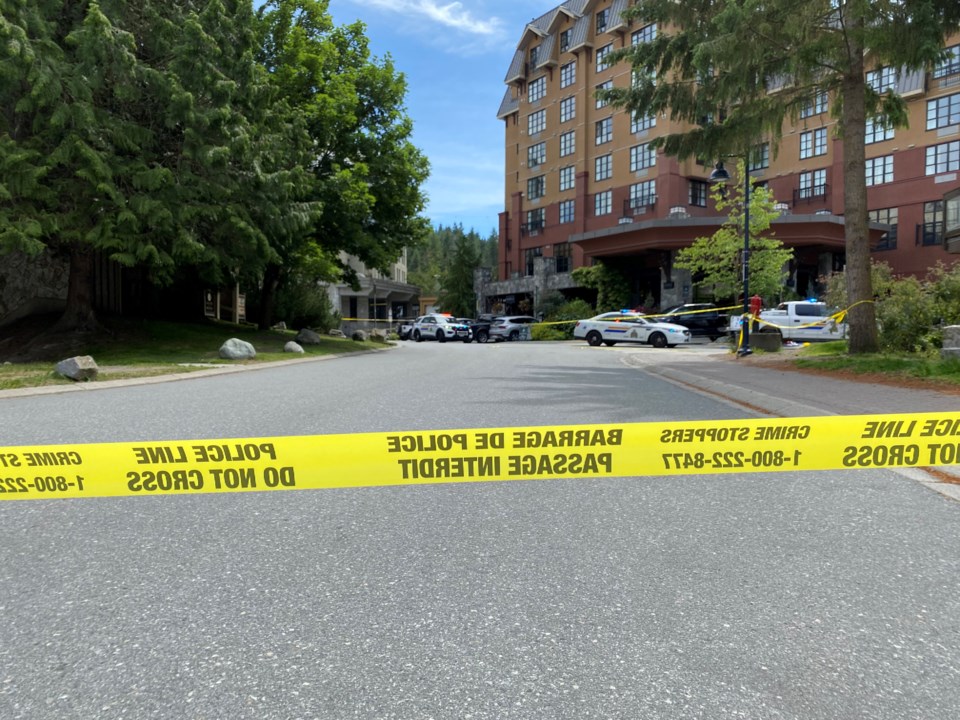Whistler is a curious town when it comes to news.
Of all the places I’ve reported—both big cities and small towns, in print and on TV—none could boast the sheer amount of regular animation that occurs in Whistler.
You never have to look too far for an event, or a festival, or a municipal report to dig into.
And yet, for all the activity, Whistler has always felt oddly insulated from the outside world. The proverbial “Whistler bubble” is real, and “breaking news” in the traditional sense has been few and far between in my eight years reporting in Whistler.
But every now and then, reality filters through, proving that even the most idyllic of sun-drenched Sundays can be marred by brazen violence—and reminding us that bubbles are prone to burst.
It is hard to fully reconcile all the things I’ve been thinking and feeling since in broad daylight outside of a hotel in Whistler Village on July 24 in an apparent gang execution.
As it unfolded—my phone exploding with notifications as I rushed to the scene—everything was muted by the adrenaline and uncertainty that comes with breaking news.
But as the updates slowed and then solidified into the evening, and the adrenaline fizzled out, all I was left with was anger—anger at the senseless, horrific violence in our community; at broader societal issues around addiction and poverty and inequality; at sluggish and indirect communication from officials; at the inherent chaos of the universe at large.
It was an exhausting day, physically, mentally and emotionally. I know I’m not alone in saying that.
At the Whistler Community Services Society (WCSS), calls for service increased in the 24 hours following the shooting, as residents and business owners sought resources for themselves and their staff members.
“When people are reaching out more—I know I’ve said this many times, but I think it’s worth repeating today—that’s not a sign of weakness,” said WCSS’ executive director Jackie Dickinson, in a phone call the morning after the shooting.
“I’ve been really inspired this morning by the businesses that have approached us, or the individuals who have leadership roles within local businesses in town, saying, ‘What can I do for myself and the team of people that I work with so I can support them?’
“It gives me a lot of strength that we have a community of people who want to do that, and people are advocating on their behalf to do so.”
At WCSS, staff are also trained in “critical incident stress debriefing,” Dickinson said, adding that, as of July 24, the organization began offering the service to local businesses (particularly those with frontline Village staff).
“It’s really crucial and imperative that those kinds of conversations around debriefing that critical incident for your team happen within a fairly short period of time—some people say 72 hours, some suggest longer,” Dickinson said.
“But what it’s meant to do is find common ground among the people who’ve experienced this trauma, and talk about the resources and the ways that they can continue to stay healthy and process those emotions in ways that serve them as they move forward.”
For individuals, Dickinson highlighted the BC Crisis Line (604-872-3311 in the Vancouver Coastal region— or ), and employee assistance programs offered by employers.
And as always, WCSS’ doors are open Monday to Saturday, 9 a.m. to 6 p.m., where outreach service workers are ready to help in any way they can (including through subsidized counselling sessions—call 604-932-0113 or book online at ).
“Sometimes when these incidents happen, people are fearful to reach out because they think that someone has had a more difficult or more connected experience to the trauma, so, ‘Oh, well I wasn’t first-hand to witness it, I know someone who was, and should I really be feeling the way I’m feeling?’ Absolutely you should,” Dickinson said.
“My fear would be that people don’t ask for help because they’re worried that [other] people need it more, and that’s a really common thought in this situation—so please reach out for help.”
When I woke on Monday morning, my anger had mostly subsided.
I watched the light playing off the trees outside my window as I sipped my morning coffee; took extra notice of the silence of another perfect Whistler morning.
Man plans, God laughs, and the world around us carries on in blissful, chaotic ignorance of our personal and collective traumas.
Before long, the bubble reforms, shiny and bright as ever.
Until the next pin prick.




